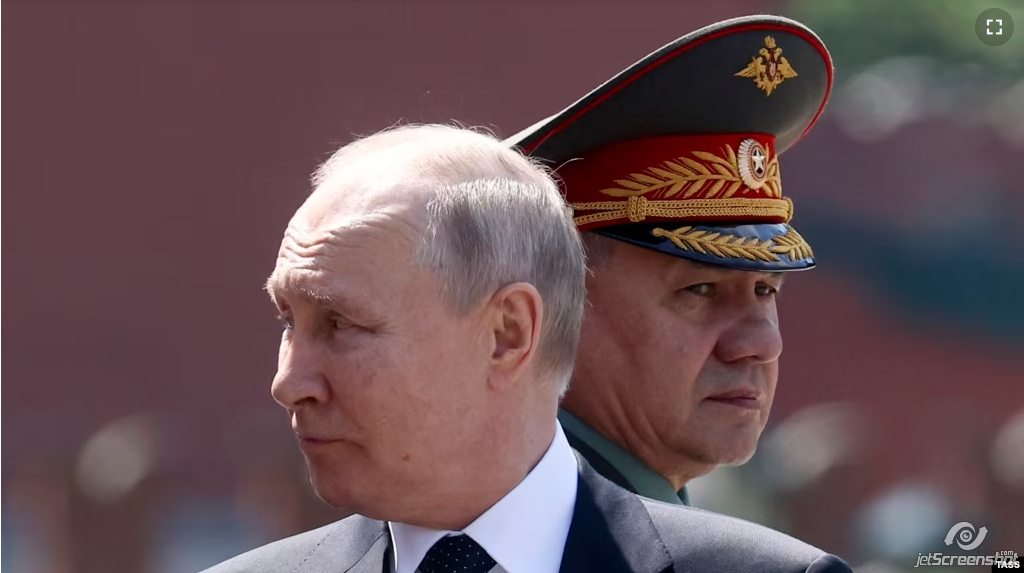By Kseniya Kirillova, for CEPA
Russian extremist propaganda may reveal more about the regime’s weaknesses than it would wish.
Sometimes the audience is more interesting than the speaker.
That was the case on August 7, when Andrey Ilnitsky, a Third-Class State Counsellor and advisor to the Russian Minister of Defense, held prayer beads in his hands as he delivered a lecture on the psychological war of the West against Russia at one of the best-known Orthodox monasteries in the country, Optina Pustyn.
Attendees in the hall included Russian Orthodox churchmen, but most were military personnel from the Strategic Missile Forces (RVSN), responsible for the country’s nuclear weapons.
Ilnitsky was there to explain the West’s main goal, which he described as the destruction of Russia. He referred to Vladimir Putin as a “czar”, and the state as the “sacred foundation of civilization”, while stating that the country’s destiny was determined not by elections but by the “Russian cultural code.”
The state counselor’s musings are a worry. Experts have repeatedly noted that lacking its own ideology, the Russian state has borrowed it from the ideas of nationalist Bolsheviks and religious radicals. It is alarming that this ideology is now actively propagated among those who potentially have access to the nuclear button.
Why spread such malign and dangerous theories? Well, perversely, it may partly be because the defense ministry and even its ultimate boss in the Kremlin are not wildly popular among Russian military personnel.
For instance, in mid-July, retired Colonel General Leonid Ivashov, who had spoken against a full-scale war with Ukraine even before its onset, gave a lengthy interview to the pro-government publication Svobodnaya Pressa, where he criticized not only the army leadership but also Putin himself. He specifically noted that the July sacking of Major General Ivan Popov from his position as commander of the 58th Combined Arms Army could only have been a decision of the Supreme Commander-in-Chief, not officials from the Ministry of Defense.
By his own account, Popov’s removal was triggered by his complaints that heavily engaged units under his command in occupied Ukraine’s southern regions were suffering a “huge loss of life and injured” from Ukrainian artillery, lacked counter-artillery battery ability, and refused to rotate exhausted troops out of the frontline.
Popov said he was stabbed in the back by the higher-ups in the defense ministry, a noxious idea should it become widespread. Ivashov also complained about the army’s lack of professionalism and made the pointed (and possibly dangerous) connection to the heart of the Putin regime — that “80% of Russia is the private property of a very narrow circle of individuals”, and that Russian soldiers are required to die for this “ill-gotten” property. Thus, he said, if the regime used nuclear weapons to protect this property, it would be a strike not against the enemy but against Russia.
Of course, Leonid Ivashov’s words do not imply that a mutiny is brewing in the army. Moreover, the general himself has repeatedly noted the caution of the generals and stated that many have privately signaled approval of his anti-war statement, but no one dared to support him officially. Taken together, the statements are a reminder that while Putin seems to have de-fanged the Wagner Group following the June mutiny, unrest within the army has not disappeared.
Popular attitudes are also far from universally supportive. In early August, a group of young people in Zabaykalsky Krai in the Russian far east attacked a veteran of the so-called special military operation, accusing him of being a child killer and ripping off his medals. This incident not only led to the initiation of multiple criminal cases against the assailants but also triggered a sense of alarm among Russian military analysts. More alarming for the population are extensive reports of the long-predicted violence of returning servicemen, especially the newly released frontline ex-convicts.
There is a chasm between these two views of ex-servicemen. In an article published on a website closely linked to the defense ministry, the authors reminded their readers that “tens of thousands of the veterans of Afghan war were made to be ashamed of their military past” and speculated that society might now be “heading toward the disgraceful stigmatization of veterans of special operations.” To avert this, they recommended an “unprecedented level of transparency” in legal proceedings against anyone attacking an ex-serviceman and advocated for the most severe penalties.
Whether that will heal the wounds of the war is doubtful, indeed it may even make things worse. At some point, society at large and the once-vaunted armed forces will have to acknowledge their role in the invasion of a peaceful neighbor and the atrocities against its people. This will be hard to swallow. If it ever happens, it will come later rather than sooner.
By Kseniya Kirillova, for CEPA
Kseniya Kirillova is an analyst focused on Russian society, mentality, propaganda, and foreign policy. The author of numerous articles for the Jamestown Foundation, she has also written for the Atlantic Council, Stratfor, and others.
Europe’s Edge is CEPA’s online journal covering critical topics on the foreign policy docket across Europe and North America. All opinions are those of the author and do not necessarily represent the position or views of the institutions they represent or the Center for European Policy Analysis.





